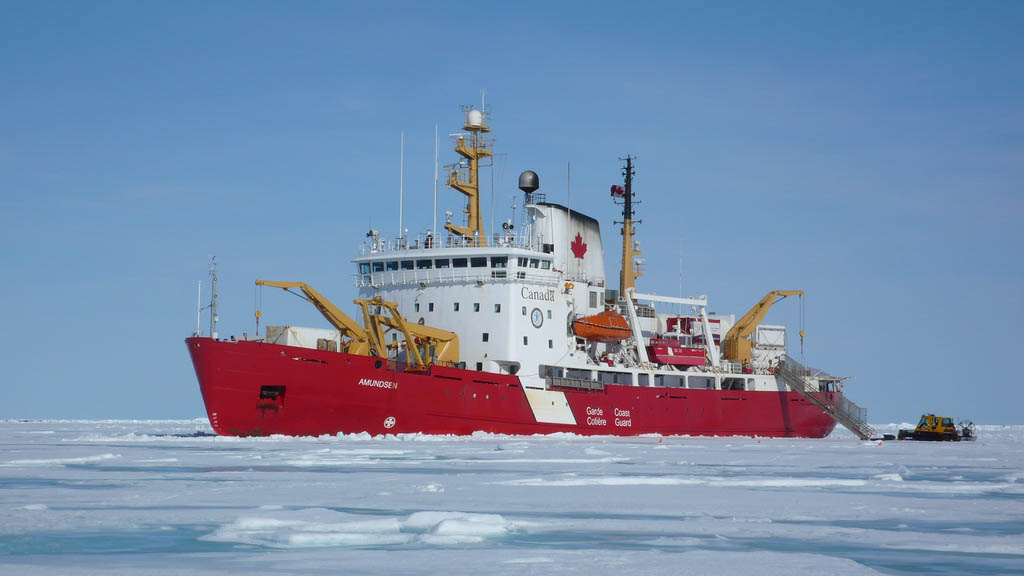On July 16th, the Canadian research icebreaker CCGS Amundsen left Quebec City for its 16th annual scientific mission. The multidisciplinary expedition will run until October 24 2020 and will allow a reduced contingent of scientists from national research teams to study the marine and coastal environments of the Canadian and Greenlandic waters.
The COVID-19 pandemic has drastically changed the way oceanographic research is conducted from the CCGS Amundsen in 2020. All 2020 field season programs that had an international component or that were targeting regions above 60°N have been postponed to 2021. As such, the CCGS Amundsen-related scientists will not be transiting through any northern community in 2020.
“Amundsen Science‘s primary objective during the current pandemic is to maintain acceptable at-sea research activities while taking the appropriate measures to not affect the health and safety of Canada’s northern communities and safeguard all sea-going personnel and support staff ashore,” says Alexandre Forest, executive director and COO, Amundsen Science.
The 2020 CCGS Amundsen scientific expedition will primarily focus on sub-Arctic operations in the Labrador Sea carried out by a reduced science crew in support of four main scientific programs:
- The Atlantic Zonal Off-Shelf Monitoring Program (AZOMP), led by Fisheries and Oceans Canada in collaboration with Amundsen Science and the universities of Dalhousie, Alberta, Manitoba, Laval, and Québec à Rimouski, studying the ocean climate variability and biogeochemistry of the Labrador Sea. AZOMP has been held annually in this sector since 1990;
- Natural Resources Canada Marine Geoscience Spatial Planning Program (pending approval) involving seafloor sediment surveys and deep-sea sampling operations at key geological sites of the Northeast Newfoundland Shelf and Slope- an area known for high-density populations of deep-sea corals, sponges and sea pens – to support ocean management activities in the region;
- The Deep-water coral/seep habitats program led by Dalhousie University in collaboration with Memorial University, Fisheries and Oceans Canada, and University of Calgary, that aim at characterizing the Northern Labrador Sea and coastal environments using the co-located sampling of several different ecosystem components;
- An opportunistic seabed mapping program of the southeastern Arctic region, led by the Canadian Hydrographic Service in collaboration with Amundsen Science and the University of New Brunswick, aiming to expand the modern hydrographic data coverage in the Low Impact Shipping Corridors of eastern Canada.
Fresh out of a recent drydock, the research icebreaker CCGS Amundsen has undergone significant improvements in its pool of scientific equipment. A new EK80 echosounder to study fish and plankton was installed through the hull and a new CTD-Rosette oceanographic profiler to sample the water column was procured. The improvements also include the acquisition of a light work-class Comanche Remotely Operated Vehicle (ROV), replacing the previous decommissioned ROV unit, that will be integrated to the ship and fully tested as part of the 2020 expedition. The first scientific mission of the new Amundsen’s Comanche ROV in the Arctic is planned for 2021.
“The new state-of-the- art wideband EK80 echosounder will allow us to document the vertical distribution of fish and zooplankton with a 1-cm resolution every second along the ship’s track. This new instrument will also help us to identify more precisely which species are present in the water column. Ultimately, it will greatly increase the accuracy of our abundance estimates for fish and zooplankton in the Labrador Sea and the Canadian Arctic,” mentioned Maxime Geoffroy, Research Scientist at the Marine Institute of Memorial University and Chief Scientist on one of the 2020 expedition legs
About Amundsen Science
Hosted at Université Laval, Amundsen Science is the organization responsible for the management of the scientific mandate of the research icebreaker CCGS Amundsen. Mobilized for science in 2002 thanks to major grants from the Canada Foundation for Innovation and other partners, the CCGS Amundsen has been pivotal in revitalizing Canada’s research effort in the study of the changing Arctic Ocean and the health of Canadian Inuit. Since 2003, the research icebreaker has accommodated over 115 Canadian and international teams in the deployment of no less than 45 major science programs, totalling nearly half a billion dollars in research investments.







